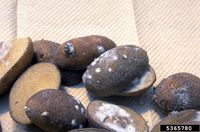Phytophthora infestans
| Literature database |
|---|
| 1225 articles sorted by: |
| • year (descending) |
| • research topics |
| • countries/regions |
| • host plants |
| • list of antagonists |

Author(s): Howard F. Schwartz, Colorado State University, United States
Source: Wikimedia Commons
Phytophthora infestans (Mont.) de Bary - (late blight)
The oomycete causes late blight of potato and some other members of the family Solanaceae like tomato. Late blight is considered to be the most important potato disease. It is thought to have originated from Mexico, but now has a world-wide distribution.
The pathogen is airborne and infects the foliage, stems and tubers. It can survive in infected tubers between cropping seasons or in form of durable oospores.
Resistant cultivars are the most effective control option. However, the fast evolving organism can overcome resistance quickly. E.g. resistance by the R-genes (R1, R2, R3, R4 and R10) derived from the wild dwarf potato, Solanum demissum, broke down quickly. Whereas the resistance genes R5, R8 and R9 are still being used.
| Vernacular names | |
|---|---|
| • Deutsch: | Braunfäule der Kartoffel Knollenfäule der Kartoffel Braunfäule der Tomate Kraut- und Knollenfäule der Kartoffel Krautfäule der Kartoffel |
| • English: | late blight tuber blight potato blight Irish blight |
| • Español: | añublo, tizón tardío en papa mildiu de la patata |
| • Français: | mildiou de la pomme de terre |
| • Português: | requeima da batateira |
Asexual reproduction involves the formation of lemon-shaped sporangia (30-50 µm long and 20-30 µm wide) which release around 10-20 biflagellate zoospores. Chlamydospores (durable asexual spores) are not known. P. infestans can reproduce sexually when the two mating types, A1 and A2, are present in a population. Such sexual reproduction can lead to more virulent pathotypes. Currently, the mating type A2 is not as widely distributed as A1. During the sexual reproduction, spherical, thick-walled oospores are formed which are around 30 µm in diameter and can persist in the environment.
For details see the respective page in Wikipedia.
- Other images of Phytophthora infestans (Wikimedia Commons and IPM Images - click to enlarge)
- Symptom potato late blight.jpg
potato leaf with symptoms of late blight infection



